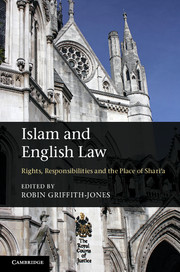Book contents
- Frontmatter
- Contents
- List of contributors
- List of abbreviations
- Preface
- Introduction
- Part I The Archbishop of Canterbury and shariʽa law
- Part II The Archbishop’s proposal for ‘transformative accommodation’
- Part III Responsibilities and rights
- Freedom of speech, incitement to religious hatred: beyond the divide?
- Religion, the state and the meaning of ‘jihad’
- 16 Towards an Islamic society, not an Islamic state
- 17 Following shariʽa in the West
- 18 Violence, personal commitment and democracy
- Part IV Prospect: equality before God and before the law
- Select bibliography
- Index of cases
- Index
- References
17 - Following shariʽa in the West
Published online by Cambridge University Press: 05 April 2013
- Frontmatter
- Contents
- List of contributors
- List of abbreviations
- Preface
- Introduction
- Part I The Archbishop of Canterbury and shariʽa law
- Part II The Archbishop’s proposal for ‘transformative accommodation’
- Part III Responsibilities and rights
- Freedom of speech, incitement to religious hatred: beyond the divide?
- Religion, the state and the meaning of ‘jihad’
- 16 Towards an Islamic society, not an Islamic state
- 17 Following shariʽa in the West
- 18 Violence, personal commitment and democracy
- Part IV Prospect: equality before God and before the law
- Select bibliography
- Index of cases
- Index
- References
Summary
This whole discussion has one objective in view: to make it possible for us all in the West to live together, understanding each other in a peaceful – and not only peaceful, but positive – coexistence, all of us contributing to our shared future here. And not only in the West. We have no right to concentrate just on our own welfare and to forget about injustices elsewhere. We have a long way to go, in order to understand each other and to build what we have to build together.
All such discussions are based on particular definitions and interpretations of the central terms. (And when it comes to religious teachings, neither Abdullahi An-Naʽim nor I would ever claim to represent all Muslims.) Our terms are coloured by the context from within which we are using them. An-Naʽim and I are using the same terms, but he and I would not agree on their definition. Take ‘secularism’, for example. An-Naʽim suggests that the British system is not secular enough; but in Paris you will hear people say that the British system is not secular at all. And in the US there is, as An-Naʽim has pointed out, yet another type of secularism. We too easily confuse the definition of secularism with the particular historical models of secularism under which we live and which we have in mind. We need to clarify the definitions of such terms and the circumstances that affect their interpretation. Some of the differences in definition are indeed normative, but others grow from very specific conditions: some of these conditions are (as we have just seen) historical, and some are psychological.
- Type
- Chapter
- Information
- Islam and English LawRights, Responsibilities and the Place of Shari'a, pp. 245 - 255Publisher: Cambridge University PressPrint publication year: 2013
References
- 1
- Cited by



